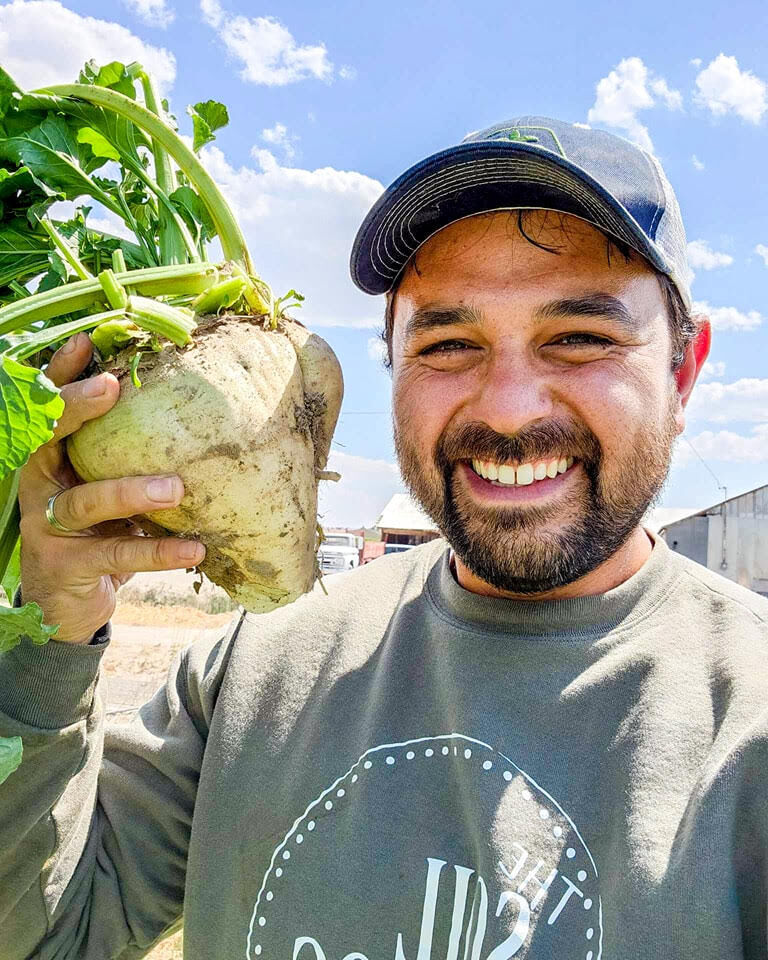From Soil to Sky: Drone agronomist sets focus on farming future
Published 12:09 pm Friday, September 15, 2023

- Michael Navarette spends a lot of time with drones observing from above, but has no qualms about getting into the soil to understand its needs, seen here holding up a clearly successful sugar beet from the crops in his care.
FRUITLAND, Idaho — As Michael Navarette prepares his motors and propellers, calibrates GPS fidelity to his point-cloud systems, adjusts for wind and readies for launch, you might guess he’s about to explore the atmosphere, perhaps the cosmos.
But actually, this is just modern farming.
Navarette operates out of Fruitland, Idaho, under his LLC business as the ‘Soil Doc’, and the drone equipment he’s preparing is no toy, but a high-end utility, complete with national operating license and insurance.
“So what I am is an agronomist,” says Navarette, “an agronomy consulting business in which I work with farmers to maximize their yields, somebody who deals with soil plants, water, fertilizer, puts it into a nice package for the farmer, and makes it easy to understand.”
A single morning’s flyover can tell Navarette almost critical details about a crop’s needs across thousands of acres of farmland with consistent accuracy, a task that can take a day on foot for some operations.
Navarette’s family itself is rooted in farming, starting with his grandfather buying land shortly after world war 2, settling into Ontario, Oregon to raise his family. Five of his sons carried on the tradition, and raised young Michael into the industry.
He attributes his passion for science to the 4th grade SMILE program hosted by his school, an acronym for Science and Math Investigative Learning Experiences. As his tech skills grew, they trickled into improving the farm work at home.
“So when I just started out it was simple stuff, looking at soil samples,” said Navarette, “by digitizing soil samples, making the farmers’ data more available to them, it’s been able to bridge a gap in communication, increasing productivity.”
“I would say as a young farmer agronomist I’m pleased to see the farming community embrace the younger generation and help them grow and expand,” he said, “farming isn’t something you go into on a whim, it’s not for the faint of heart.”
Navarette took his dreams further still, though originally he’d focused on Biology and Spanish in his curriculum, eventually he earned his Agronomy masters out of Iowa State University, and an undergraduate degree out of University of Portland.
Adding an agricultural drone license to his repertoire allows him to help farmers seed, spray and fertilize with unique efficiency, and in itself is a satisfying pastime.
Navarette’s drone, an Agras T30, was a nearly $32,000 investment including its attachments, but in all it can hold 8 gallons of spray, and hoist upwards of 175 pounds into the air should the need arise. It’s smart enough on its own to avoid collisions without human interference.
“Drones are an emerging technology that’s only going to continue to expand,” says Navarette, and given the unusual seasons of the last couple years especially, he had some concerns about established farms not adding the new tools.
Navarette keeps a tab on the upcoming science particularly. On a recent visit to Nyssa he got to see a Carbon Robotics laser-weeder, a large, rolling system that blasts weeds with pinpoint accuracy, plausibly as finite as individual aphids, while delicately avoiding actual crop sprouts in the process.
In all the tech could mean less spraying, less fertilizing and less weeding as selected plants can finally use the fullest of their provided resources, as the machinery becomes more commonplace Navarette thinks he’ll be investing soon enough.
“Farm technology is very expensive, and either you’re growing as a farmer or you’re doing one kind of crop very and that’s how you’re able to persist, but it’s the ones that continue to grow that have more capital and invest in different sectors of agriculture,” said Navarette.
Navarette says that ag interests should keep a close tab on developing tech solutions, independent trade magazines particularly can offer a glimpse of new tools as they become available.
As far as investing in such equipment, he recommends a lateral approach, rather than waiting for salesmen to come calling.
“Reach out to the company directly,” he said, “tech companies are very ‘flat’, so it’s likely you’ll talk to the CEO or someone who wants to partner to get the tech out there. From there, if the tech works, decide to invest or utilize the tech and promote it so it can grow and get better.”
“Farmers should continue to expect unpredictable conditions, year after year,” says Navarette.





